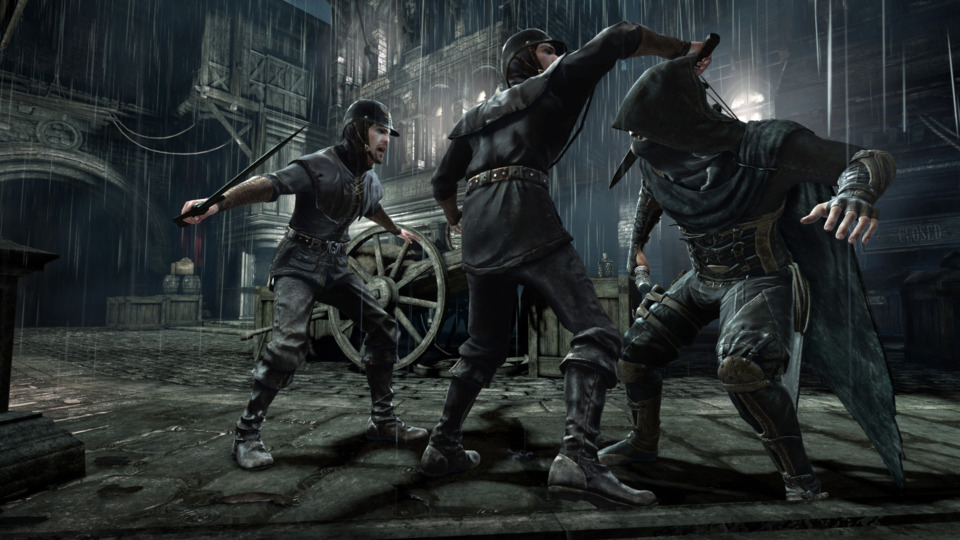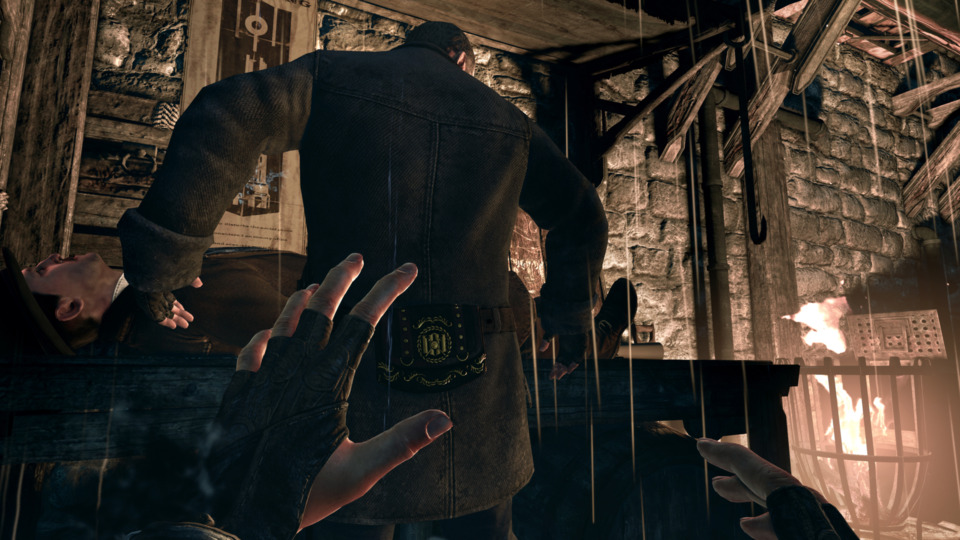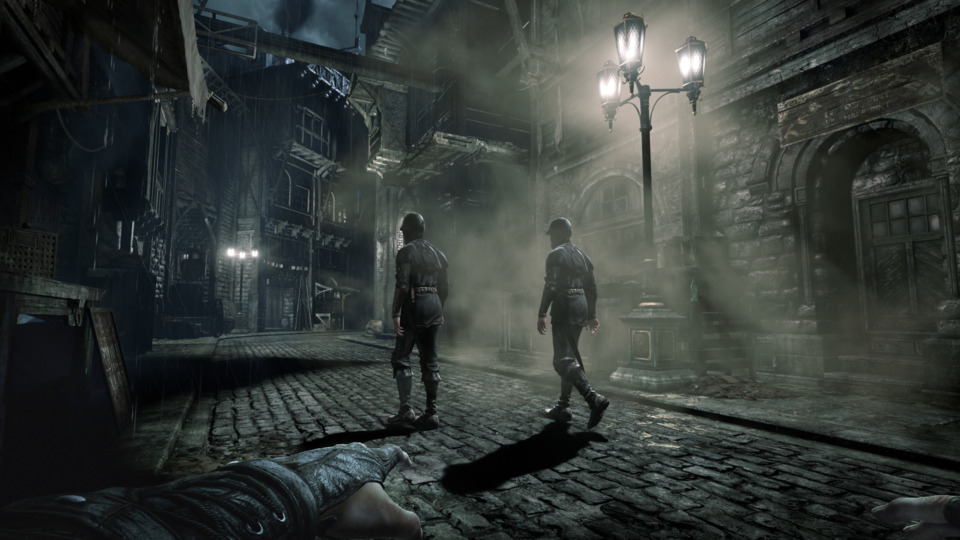A good stealth game makes you feel like a silent badass. A bad one makes you feel like an idiot stumbling around in the dark. It is with much regret that I inform you that Thief, Eidos-Montreal's update of Looking Glass Studios' classic stealth franchise, leans more toward the latter. As master thief Garrett, you spend hours sneaking around a dank city, plucking coin and other valuables from every available drawer, pocket, and hidden safe you can find. This is the part Thief gets right, which makes the many aspects that it gets wrong all the more bewildering. Instead of focusing on Garrett's chosen profession, Thief spirals into yet another story of apocalyptic mysticism and grand conspiracy, and often does so at the expense of the game's best aspects. Moments of true thievery are frequently left to side missions, which leaves roughly 10 hours of story in which you navigate bland mazes of narrow corridors, dull traps, and dimwitted A.I. foes, all for an end result that does nothing but underscore what a colossal waste of time the whole endeavor ultimately was.

Before Garrett becomes wrapped up in all this world-ending nonsense, he is The City's number one thief. Whether rich or poor, Garrett steals from anyone who happens to have something he might want, and he's managed to avoid jail and death primarily through his deeply rooted sense of self-interest. One fateful night, Garrett and his protege--a young woman named Erin--stumble upon The City's generically vile Baron conjuring up an ancient power. Garrett, sensing this is a situation he can't properly handle, tries to escape, but Erin plunges ahead and ends up crashing through the ceiling into the middle of this bizarre ritual. A lot of blue lights and smoke effects consume the screen, and suddenly... nothing. Garrett awakes on a cart full of dead bodies, only to discover he's been asleep for the better part of a year. With no idea what's happened, Garrett sets about uncovering the mystery of the ritual, Erin's fate, and the terrible disease that's gripped the whole of the city in his absence.
Where that plot goes is extraordinary only in its mundanity. It sounds like an unfair dismissal to just say nothing interesting happens in Thief, but as I sit here, racking my brains to try and come up with one element of the story that stood out in the slightest, I just can't. Thief plods along at a pace that ranges from slow to excruciatingly sluggish, and at no point does it ever deliver a new character or situation worth caring about. The characters are acted well enough in most cases, but Garrett often sounds barely interested in what they have to say, and the script never fleshes out any of them sufficiently enough to grab your attention. This makes moments of presumed satisfaction--such as the culmination of Garrett's barely formed rivalry with the city's top corrupt cop, or the sudden reveal of a bad guy's true motives toward the end of the game--fall completely flat.
It doesn't help that Thief's story missions often seem only mildly interested in Garrett's role as a thief. Sure, the entire game is built with stealthy environmental traversal in mind, but few story missions require you to do much actual thieving. There's certainly loot to be found in each chapter, and collecting it allows you more funds to use to purchase upgrades for Garrett. But all that stuff is optional. In most missions, you're tasked with hunting for clues that tie in to the game's overarching mystery, one that becomes less and less interesting as it goes along.
This is Thief's greatest folly. It gives you this character with all these nifty abilities that should make him a great thief, then spends the entirety of its storyline making him investigate a supernatural mystery of no particular interest. Instead, it relegates much of the thievery to scattered loot and side missions. In these side missions, you'll have the opportunity to earn quite a bit of coin doing jobs for various unscrupulous types, stealing all sorts of different goods. These missions aren't often terribly involved, but they make the best use of Garrett's abilities, and there are quite a lot of them. Whether you're sneaking into an apartment to grab a valuable painting, or tailing a drunk through the streets to find where he's hiding stolen goods, these are the moments that best line up with what a game called Thief ought to be. It's just a shame that these missions are so far out of the way from the main story, where the act of thievery feels mostly incidental to the larger, less interesting mystery.
But that's Thief in a nutshell, a game that spends an inordinate amount of time making the player do uninteresting things while shoving the more fun stuff so far in the corner you'd be forgiven for missing most of it. Its mechanics feel best suited for gameplay scenarios the main story doesn't often care much about. Sure, whether it's in the story or on a side venture, you'll have to play a similar kind of stealth in order to avoid spooking guards and progress through the stage. But the sense of reward for that careful sneaking feels loads more satisfying when you're just nicking trinkets and valuables, versus the slog of trudging through the awful plot.

In a best-case scenario, you'll spend much of Thief cloaked in the shadows, avoiding bad guys rather than directly engaging them. In some cases this works well, especially if you take the time to learn the environments and discover their many available hiding places. (I say "if" as if there's much choice in the matter, but in truth you'll have no choice but to learn the environments through repeated trial-and-error.) In a worst-case scenario, you'll find yourself often surrounded by four or five bad guys because you somehow alerted a guard without realizing it. This is not a game in which combat is recommended whatsoever. If you can sneak up behind a guy and take him down unawares, then great. But head-on fights involve you swinging your trusty cudgel over and over again while trying to time dodges against enemy swipes and shots. Every fight is essentially the same dodge-and-swipe situation, and if you've got more than a few guys surrounding you, you're usually screwed. Unless they suddenly get stuck running up against a piece of the environment, or inexplicably just stop and stare at you from a few feet away, that is.
Again, taking enemies head-on is very much not the point of the game, but it's rare that Thief allows you enough leeway to truly avoid all confrontations. Every environment feels cramped and tight, which means you frequently have to walk within inches of bad guys just to get to the next area. Sometimes it's easy enough to predict what will alert an enemy to your presence, but other times it just comes out of nowhere. This means it's often best just to wait until you can get a guy alone, sneak up, and whack them from behind. You do this again and again and again until you get to the next checkpoint, which makes the game sometimes feel a bit like an especially sneaky rendition of whack-a-mole. You can cause distractions by tossing objects, or by using one of the many different arrows Garrett comes equipped with. Sometimes these are effective in sending guards off in the opposite direction, and sometimes it just causes them to all freak out and start running around every which way. Most often, your best bet is just using water arrows to snuff out fires while skulking around in the dark, hoping you don't happen upon anyone you won't be able to avoid fighting.
This combat stuff would mean less if the environments were better-designed, but navigating Thief's world is rarely very exciting. Using Garrett's "swoop" ability to dash from one dark corner to another is a delight, but many of his other movements are saddled to an all-purpose action button. Garrett can't even jump freely, which forces you to find ledges and corners that will trigger his various leaping animations. Finding those isn't terribly difficult, mind you. Garrett's brush with mystical forces gives him a "focus" ability that highlights all the different traps, climb points, and other areas of interest within his field of view. In general, the only real challenge to traversing the world is how easy it is to get turned around and suddenly find yourself at a dead-end. With this added ability, it becomes super easy to just figure out where to go in most situations. On the one hand, this relieves frustration you may feel with the game's map, which borders on useless. On the other, the only real challenge then comes from finding ways to avoid fights. Those looking for a tougher challenge will find it if they skip out on using the focus ability and ramp up the difficulty level. Playing on the higher levels imposes some tough restrictions on attacking foes, which in turn makes careful play all the more vital. Plotting an ideal path through a bunch of clueless enemies can certainly be satisfying, but even in more challenging situations, the path to success is rarely that hard to uncover.
More disappointing is how bland and cramped every environment feels. Thief flirts with the idea of an open world outside of its story chapters, but in reality, The City is just a series of small open sections bookended by load times. When you first exit Garrett's hideout and enter The City, only minutes go by before you come upon your first door or window that leads to another load time. It's surprising just how often these pop up, and it sucks nearly all the fun out of exploring The City. That's unfortunate, since exploring The City is exactly what you'll have to do in order to take part in those side missions. If there's any positive here, it's that you can often use these load times to your advantage when being chased by enemies. Once you hit one of those new area access points, all you have to do is press a button and suddenly you're out of the fire.

Thief's small environments might be more forgivable if the game were some kind of visual powerhouse, which it most certainly is not. Character and environment art are caked in a steampunk-lite industrial vibe, but without any unique flavor or style to call its own. It's all very drab, which perhaps fits with the game's gloomy atmosphere, but doesn't lend itself toward being especially memorable. In fact, all I really remember about Thief's visuals is how bad nearly all the animation looks, especially in any combat situation. Arms flail about until either you reach a quicktime event pops up to let you K.O. them, or they run out of health and fall over in an animation that looks like a bad placeholder. The game does at least run reasonably well on PC, though I kept running into a bizarre array of audio glitches throughout my playtime. Key dialogue would somehow get mixed down to the point of being inaudible against background sounds, or sound effects would sometimes drop out altogether. And then there were the random crashes, which popped up at least a half-dozen times over the course of my playthrough.
Above all else, Thief's greatest crime is one of boredom. Too much of its gameplay is bereft of excitement or satisfaction. Instead of feeling like a master thief, you mostly spend the game feeling like a generic first-person action hero who just happens to be especially bad at fighting people. Sneaking around Thief's world is intermittently interesting, especially when the game puts its focus squarely on the act of stealing, but even those moments are frequently brought down by the game's various rough edges. You have to work very hard to find the fun bits of Thief, and more often than not, the payoff just isn't worth the effort.